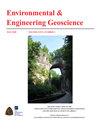Influence of Desert Springs on Habitat of Endangered Zuni Bluehead Sucker (Catostomus discobolus yarrowi)
IF 0.7
4区 工程技术
Q4 ENGINEERING, ENVIRONMENTAL
引用次数: 1
Abstract
Located on the southeastern part of the Colorado Plateau, the Zuni Mountains are home to the endangered Zuni Bluehead Sucker (ZBS) (Catostomus discobolus yarrowi). A 4-year study was conducted on a low-flow (<80 cm3/s) hillslope spring and intermittent stream, that are home to one of the three remaining ZBS populations. Seasonal measurements of physical and hydrochemical parameters were used to estimate the contribution of groundwater to the stream and to identify geologic and hydrologic controls for the spring discharge. Seasonal concentrations and standard deviations (s) of Mg2+ were used to determine that the spring water (5.6 mg/L; s = 0.4) and surface water up-gradient from the spring input (10.7 mg/L; s = 11.2) is from different sources. Surface water down-gradient from the spring input maintain ZBS populations and is a mixture of spring water and up-gradient surface water. Mass solution mixing was used to determine spring water contributes up to 99 percent of the down-gradient water during drier seasons. Isotopes (δD, δ18O, 3H) indicate that the spring water has been recharged primarily from snowmelt within the last 70 years, while up-gradient surface water is seasonal runoff from rain and snowmelt. Continuous monitoring of dissolved oxygen (DO) mean concentrations (up-gradient = 1.6 mg/L and down-gradient = 5.7 mg/L) indicated that surface water up-gradient from the spring input are anoxic and unable to support ZBS. Surface water down-gradient from the spring input maintain appropriate DO concentrations due to perennially discharging spring waters re-aerating downstream habitats.沙漠泉水对濒危祖尼蓝头吸盘生境的影响
祖尼山脉位于科罗拉多高原的东南部,是濒临灭绝的祖尼蓝头Sucker (ZBS) (Catostomus disbolus yarrowi)的家园。一项为期4年的研究是在低流量(<80 cm3/s)的山坡泉水和间歇溪流上进行的,这里是ZBS剩余三个种群之一的家园。利用物理和水化学参数的季节性测量来估计地下水对河流的贡献,并确定对春季排放的地质和水文控制。利用Mg2+的季节浓度和标准偏差(s)确定了泉水(5.6 mg/L;s = 0.4)和地表水从泉水输入向上梯度(10.7 mg/L;S = 11.2)来源不同。从泉水输入向下梯度的地表水维持了ZBS种群,并且是泉水和向上梯度的地表水的混合物。使用质量溶液混合来确定在干旱季节泉水贡献高达99%的下降梯度水。同位素(δD、δ18O、3H)表明,近70年来泉水主要由融雪补给,而上梯度地表水主要由降雨和融雪季节性径流补给。连续监测溶解氧(DO)平均浓度(上梯度为1.6 mg/L,下梯度为5.7 mg/L)表明,从泉水输入向上梯度的地表水是缺氧的,不能支持ZBS。由于常年排放的泉水对下游栖息地进行再曝气,从泉水输入向下梯度的地表水保持了适当的DO浓度。
本文章由计算机程序翻译,如有差异,请以英文原文为准。
求助全文
约1分钟内获得全文
求助全文
来源期刊

Environmental & Engineering Geoscience
地学-地球科学综合
CiteScore
2.10
自引率
0.00%
发文量
25
审稿时长
>12 weeks
期刊介绍:
The Environmental & Engineering Geoscience Journal publishes peer-reviewed manuscripts that address issues relating to the interaction of people with hydrologic and geologic systems. Theoretical and applied contributions are appropriate, and the primary criteria for acceptance are scientific and technical merit.
 求助内容:
求助内容: 应助结果提醒方式:
应助结果提醒方式:


